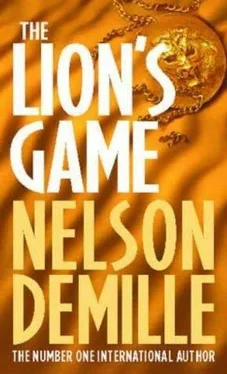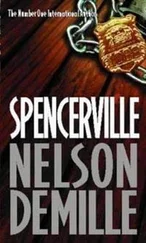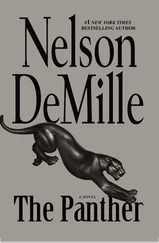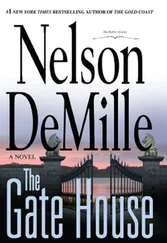Asad Khalil murmured a prayer of thanks, opened his eyes, and stood. He focused on the wall clock across the room and saw that over two hours had passed, though it seemed only minutes.
He gathered his black bag, left the room, and moved quickly through the deserted lobby.
Outside, he saw a solitary taxi occupied by a sleeping driver. He got into the rear of the taxi and slammed the door hard.
The taxi driver awoke with a start and mumbled some confused words.
Khalil said, "To the corporate jet facility. Quickly."
The driver started the engine, threw the vehicle into gear, and pulled away. "Where?"
Khalil repeated his destination and threw a twenty-dollar bill on the front seat beside the driver. "Quickly, please. I am late."
The driver sped up and got onto the barrier road. Within ten minutes, he was at the corporate jet facility.
Khalil said, "Over there."
The driver pulled up to a small building, and Khalil jumped out and walked rapidly inside. He located the pilots' lounge, where he found both men asleep on couches. He shook the captain and said, "I am ready. We must leave soon."
Captain Fiske rose quickly to his feet. The co-pilot was already awake, and he stood, stretched, and yawned.
Khalil looked pointedly at his watch and said, "How long will it take to leave here?"
Captain Fiske cleared his throat and said, "Well… I've already made preliminary arrangements for our outbound flight plan… in the event we needed to depart suddenly-"
"Yes. Good. We need to depart suddenly. When can we depart?"
"Well, at this early hour, there's not much other air traffic, so we can take a few shortcuts with standard procedure. With luck, we should be able to taxi out in fifteen minutes."
"As soon as possible."
"Yes, sir." Captain Fiske walked over to a telephone and punched in a few numbers.
"Who are you calling?"
"Control Tower to activate my prior arrangements." Captain Fiske spoke to someone on the other end.
Khalil listened carefully to what the pilot said, but it seemed to be nothing more than technical talk. He looked at the pilot's face, then at the co-pilot, and both men seemed composed.
Captain Fiske said into the phone, "Okay. Thanks." He hung up and said to his passenger, "They promised to have our air traffic control departure clearance within fifteen minutes. The local Tower is already coordinating it with Denver Radar."
"I was under the impression that private flights could take off and land at their convenience."
Captain Fiske replied, "That's not true for private jets, sir, because of the altitudes at which we fly. Above eighteen thousand feet, instrument flight rules always apply."
"I see. Can we go now to the aircraft?"
"Sure."
Fiske led the way out of the lounge, followed by the copilot and Asad Khalil. They walked quickly through the cold night air toward the Learjet less than fifty meters away. Khalil stayed very close to his pilots, but he had the sense that there was no immediate danger.
The co-pilot opened the door of the Lear and entered, followed by Khalil, then by the captain.
The pilots took their seats and began their pre-flight checks as Khalil took his seat in the rear of the cabin.
Captain Fiske called back through the open partition, "We'll be under way shortly. Please fasten your seat belt."
Khalil did not reply.
A few minutes later, Fiske started both engines, and the co-pilot radioed, " Springs Tower -Lear Two-Five Echo is ready to taxi."
The Tower replied, "Roger, Lear Two-Five Echo, taxi to Runway Three-Five Left. I've got your clearance when you're ready."
"Go ahead with the clearance," the co-pilot said into the microphone, then began writing down what was being said on a pad in his lap.
Captain Fiske continued to taxi the Lear 60 to the end of Runway Thirty-five L, then wheeled the jet onto the runway centerline. "Here we go," Fiske said to no one in particular as he pushed the twin throttles full forward.
Within half a minute the jet nosed up, left the ground, and was climbing away rapidly from the lights of Colorado Springs below.
Khalil watched the pilots, who had not yet slid closed the partition door between the cockpit and cabin. After a minute, he glanced out the side window to his left and watched the mountains in the distance, which were still visible in the moonlight.
The co-pilot got on the intercom and said, "We need to continue on this northbound heading for a little while longer, sir, to get some altitude before we can turn westbound and on course. We've got those little hills over there to our left, called the Rockies." He laughed and added, "Some of those peaks are twelve thousand feet-about four thousand meters."
Khalil did not reply, but he looked at the foothills and mountains to their left as they continued on what was evidently a northerly heading. Somewhere down there, Colonel Robert Callum lay in bed, a terrible disease eating away at him. Khalil did not feel cheated, nor had he felt cheated when he'd learned that Steven Cox had died in the war against Iraq. God, he decided, wished to claim his share of the spoils of war.
Kate and I spent the rest of the morning ringing the alarm bell, so to speak.
The Incident Command Center went from ant hill to beehive, if you'll pardon the insect analogy.
Kate and I fielded about a dozen calls from higher-ups, congratulating us, and so forth. Also, all the bosses wanted a private briefing from us, but we managed to put them off. They really didn't want any information-they wanted to say they were part of the solution, though, of course, they were becoming part of the problem.
Finally, I had to agree to a joint task force meeting, such as we'd had yesterday morning. But I was able to put it off until 5:00 P.M. by lying about having to stay by the phones for calls from my worldwide network of informants. In some respects, the bosses here resembled the NYPD brass when a big case was making the news. Photo ops with me and Kate couldn't be far off. In any case, by the time Jack Koenig returned from collecting frequent flier miles, the meeting would be over, and Jack would be pissed. Tough. I told him to stay here.
Within a half hour of our conversation with Mrs. Hambrecht, FBI agents were subpoenaing the phone records of Mrs. Hambrecht, and of course General Waycliff for April 15. At the same time, the good people in the J. Edgar Hoover Building were pushing hard to get the deleted information from Colonel Hambrecht's file, which I really didn't need now. But they were also trying to find the names of the surviving men in his flight who bombed Al Azziziyah, which we did need.
According to my e-mail, the FBI had immediately warned the Air Force and DoD that the men on the Al Azziziyah mission were in great and immediate danger, and that some degree of danger also existed for all the other men who flew the Libyan mission. The Air Force agreed to cooperate fully and quickly, of course, but in any bureaucracy, quickly is a relative term.
I didn't know if the CIA was being kept informed, but I hoped they were not. I still had this weird idea that the CIA knew some of this already. Okay, it's easy to get totally paranoid about those people, and half the time, as I keep reminding myself, they're not as smart or cunning as people think. But, as with any secret organization, they themselves sowed the seeds of mistrust and deception. Then they wonder why everybody thinks they're hiding something. What they're usually hiding is the fact that they don't know much. Sometimes I do the same thing, so how could I complain?
I never actually thought that the FBI-which is the heart of the Anti-Terrorist Task Force-knew more than they were telling us in New York. But I was convinced they knew, as Kate said, that the CIA was in business for itself. And they let it pass because, after all, we're all on the same team, and we're all on the side of the angels, and everybody has the best interests of the country at heart. The only problem was in defining best interests.
Читать дальше












